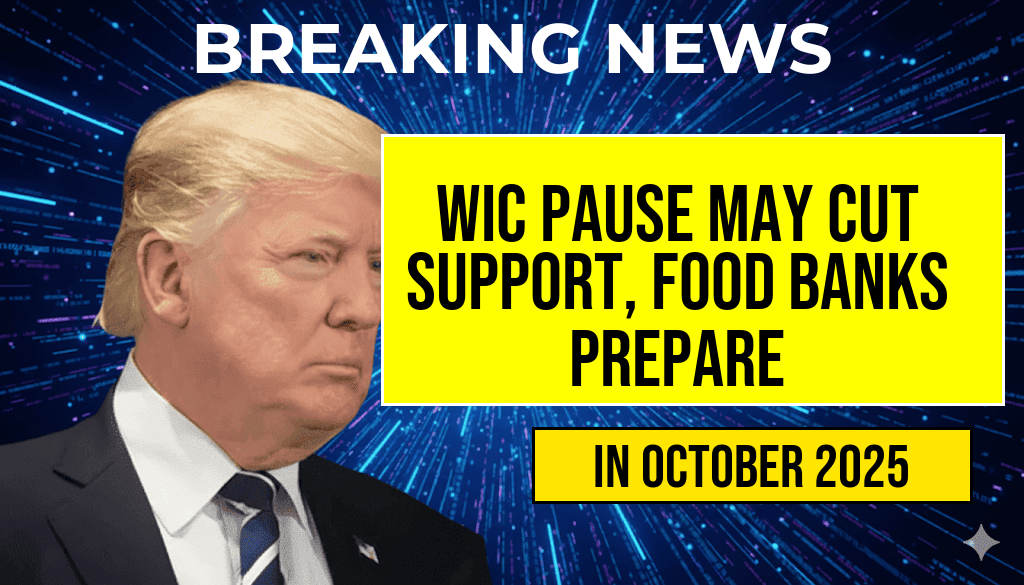WIC Program Pause Could Reduce Support by $52 Monthly for Breastfeeding Families, Food Banks Prepare for Impact
A recent decision to temporarily suspend certain benefits within the Women, Infants, and Children (WIC) program has sparked concern among healthcare providers, advocates, and food assistance organizations nationwide. The pause is expected to trim approximately $52 per month from the typical support provided to breastfeeding families, potentially affecting hundreds of thousands of participants. As food banks brace for increased demand, experts warn that the disruption could undermine nutritional progress for vulnerable populations, especially during a period of rising food costs and economic uncertainty.
Understanding the WIC Program and Its Role
The WIC program is a federal initiative designed to provide nutritional support to low-income pregnant women, new mothers, and young children. It offers access to healthy foods, nutrition education, and health care referrals. For many families, especially those relying on breastfeeding, WIC serves as a crucial safety net, ensuring infants receive vital nutrients during their formative months.
Typically, WIC benefits include vouchers for specific food items such as milk, eggs, cereals, and fruits, along with breastfeeding support. The program’s emphasis on nutrition education aims to promote healthier habits and reduce infant mortality rates. According to the USDA, WIC serves about 6.2 million women, infants, and children nationwide, making it one of the largest nutritional assistance programs in the U.S.
Details of the Recent Benefit Suspension
The temporary suspension affects certain supplemental benefits, notably those linked to breastfeeding support and related nutritional vouchers. The change was implemented as part of broader policy adjustments aimed at reallocating federal funds or responding to administrative hurdles. However, the immediate effect is a reduction in monthly financial aid for families who depend on these benefits to sustain breastfeeding efforts.
For an average family, this reduction translates to roughly $52 less per month, a significant sum considering the tight budgets many low-income families operate within. This amount could impact the ability to purchase nutrient-rich foods, breast pumps, or other essentials necessary for sustained breastfeeding and infant health.
Impact on Families and Healthcare
Experts warn that the benefit cut could lead to decreased breastfeeding rates among low-income mothers, which research links to improved infant health outcomes. Dr. Lisa Carter, a pediatric nutrition specialist, notes, “Financial barriers often discourage exclusive breastfeeding, particularly when families are forced to choose between essential expenses.” She emphasizes that reduced support may increase reliance on formula feeding, which can be more expensive and less accessible for some families.
Furthermore, the disruption risks reversing progress made in infant health metrics. Data from the Centers for Disease Control and Prevention (CDC) indicates that breastfeeding can significantly reduce the risk of infections and chronic conditions during early childhood. Loss of support threatens these health benefits, especially in communities already facing disparities.
Food Banks Prepare for Increased Demand
| Food Bank Region | Anticipated Increase in Demand | Support Strategies |
|---|---|---|
| Midwest | 25% | Expanding infant nutrition supplies, partnering with local WIC clinics |
| Northeast | 20% | Implementing targeted outreach to breastfeeding families, increasing infant-specific food distributions |
| South | 30% | Mobilizing volunteers, augmenting emergency food programs with infant-friendly options |
Food banks across the country are already strategizing to accommodate the expected uptick in demand, particularly for infant and child-specific foods. Many organizations are seeking additional funding, community partnerships, and volunteer support to bridge the gap created by the WIC benefit pause. Some are also distributing educational materials to help families make informed choices amid the financial strain.
Broader Economic and Policy Context
The temporary suspension underscores ongoing debates over federal funding priorities and support for vulnerable populations. Advocates argue that any reduction in nutritional assistance exacerbates existing inequalities, especially as inflation drives up prices on basic commodities. The U.S. Department of Agriculture (USDA) has reiterated its commitment to maintaining essential benefits but emphasizes that adjustments are sometimes necessary due to budget constraints or administrative reforms.
Meanwhile, policymakers face increased pressure to revisit funding allocations and ensure that families most in need are protected. According to Forbes, food insecurity remains a persistent challenge, with over 38 million Americans experiencing hunger. The WIC program’s role in mitigating this crisis highlights the importance of stable, uninterrupted support systems.
Moving Forward: Community and Policy Responses
Community organizations and health advocates stress the importance of proactive measures to support breastfeeding families during this transitional period. Initiatives include expanding access to free lactation consultations, increasing distribution of infant foods at food assistance sites, and advocating for policy adjustments to restore full benefits.
Some lawmakers are calling for emergency funding to offset the impact of the WIC pause. The goal is to prevent a surge in infant malnutrition rates and ensure that low-income families continue to receive the support necessary for healthy development.
As the situation unfolds, families and service providers remain vigilant, emphasizing that continued investment in nutrition programs like WIC is vital for fostering healthier futures for children across the nation.
Frequently Asked Questions
What is the reason for the WIC program pause mentioned in the article?
The WIC program pause is due to funding or administrative issues, which could temporarily limit support services for breastfeeding families and other participants.
How will the WIC program pause affect families who rely on it?
The pause could result in a reduction of support by $52 monthly for breastfeeding families, impacting their access to nutritious foods and resources.
What preparations are food banks making in response to the WIC program pause?
Food banks are preparing for increased demand and potential shortages, aiming to support families who might lose assistance from the WIC program during the pause.
When is the WIC program expected to resume normal operations?
The article does not specify an exact timeline for the resumption of WIC services, but highlights the potential short-term impact on families and support organizations.
How can families affected by the WIC program pause seek additional support?
Families are encouraged to contact local food banks, community resources, and health services for alternative assistance during the WIC program pause.










